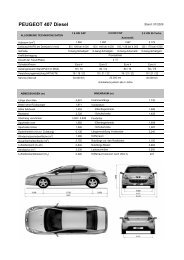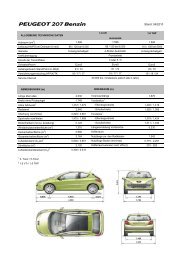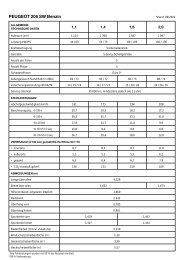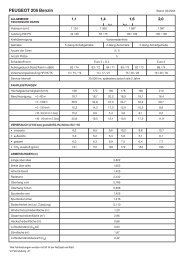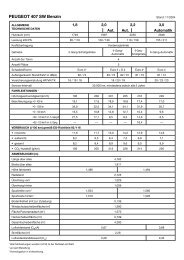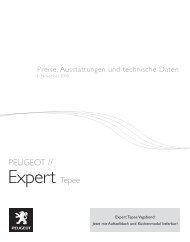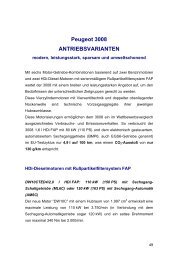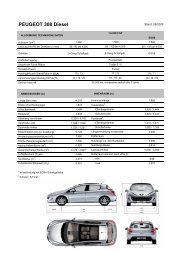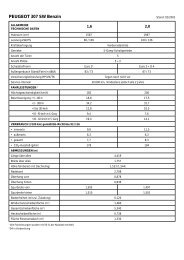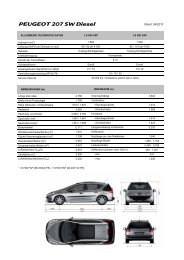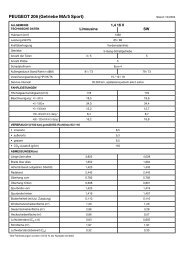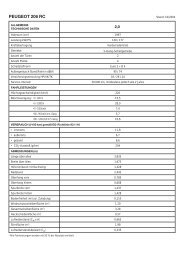PSA COUV page . page RA GB - PEUGEOT Presse
PSA COUV page . page RA GB - PEUGEOT Presse
PSA COUV page . page RA GB - PEUGEOT Presse
Create successful ePaper yourself
Turn your PDF publications into a flip-book with our unique Google optimized e-Paper software.
Growth Strategy<br />
Corporate<br />
Governance<br />
Business Review<br />
Corporate Policies<br />
Management’s<br />
Discussion<br />
and Analysis<br />
Statistics<br />
WHAT ARE BIOFUELS?<br />
Derived from cereals, sugar beets (ethanol and its ETBE derivative), or oilseeds such as rapeseed or<br />
soybeans (in the case of biodiesels), biofuels are exceptionally well suited to combating the<br />
greenhouse effect. They reduce emissions of pollutants such as particulates and, by their very nature,<br />
prevent an increase in carbon dioxide content in the atmosphere, since the plants from which they<br />
are made trap atmospheric CO 2 through photosynthesis. Biofuels are therefore fully renewable<br />
energies, although their production cost remains high.<br />
SERVICE FLEETS:<br />
<strong>PSA</strong> <strong>PEUGEOT</strong> CITROËN<br />
LEADS THE WAY<br />
The European Commission has<br />
specified that by 2020, 20% of<br />
automotive fuels must contain<br />
products of plant origin.<br />
<strong>PSA</strong> Peugeot Citroën is already<br />
setting an example in meeting this<br />
goal by encouraging its service fleet<br />
to run on biofuels. For example, 82%<br />
of the diesel fleet at the Sochaux<br />
plant—or close to 58% of the entire<br />
service fleet—ran on biofuel in 2002.<br />
Consisting of 30% vegetable oil<br />
methyl ester and 70% diesel, the<br />
fuel is already richer in plant matter<br />
than required by EU legislation.<br />
The Sochaux plant used 330,000<br />
liters of Diester ® in 2002. It intends<br />
to maintain this level in 2003, since<br />
the fuel has a favorable net impact<br />
on the environment and is suitable<br />
for use in conventional internal<br />
combustion engines, which still<br />
power most of the fleet.<br />
aftertreatment system that eliminates<br />
emissions of particulate matter, is now<br />
available on the Peugeot 307, 406, 607<br />
and 807 and the Citroën C5 and C8.<br />
The particle filter has been a popular<br />
success since it was introduced in May<br />
2000, and is already installed on 400,000<br />
diesel vehicles. By 2005, one million<br />
particle filter-equipped vehicles will be<br />
marketed a year. Already in 2003,<br />
<strong>PSA</strong> Peugeot Citroën is offering filterequipped<br />
vehicles compliant with the<br />
stricter Euro IV emissions standards<br />
scheduled for application in 2005.<br />
The particle filter has also won a number<br />
of awards, including four in 2001. In<br />
2002, Italy’s Quattroruote automotive<br />
magazine presented its Environment Prize<br />
to the filter-equipped Peugeot 607.<br />
PROMOTING BIOFUELS<br />
Another way to attenuate vehicle CO 2<br />
emissions is through the efficient use of<br />
alternative energies and new propulsion<br />
technologies. A pioneer in the field,<br />
<strong>PSA</strong> Peugeot Citroën is strongly committed<br />
to promoting biofuels that can be used in<br />
diesel or gasoline engines. Biodiesels, such<br />
BIODIESEL PERFORMANCE<br />
as the Group’s trademarked Diester ® , consist<br />
of vegetable oil methyl esters (VOMEs)<br />
blended with automotive diesel fuel, while<br />
ethanol or its derivative ethyl tertiary butyl<br />
ether (ETBE) is used with gasoline.<br />
These biofuels can be used directly in any<br />
Peugeot or Citroën vehicle, without any<br />
technical modifications. In this way, the<br />
Group’s service fleet is encouraged to run<br />
on Diester ® 30, a fuel combining 30%<br />
VOME and 70% automotive diesel that<br />
reduces CO 2 emissions by 18% and particle<br />
emissions by up to 22% in comparison<br />
with ordinary diesel fuel. What’s more,<br />
Diester ® 30 lubricates the engine system<br />
more efficiently, enhances protection from<br />
injection system wear, and ensures smoother<br />
operation of catalytic converters.<br />
<strong>PSA</strong> Peugeot Citroën also supports the<br />
development of biofuels by validating<br />
potential applications under local energy<br />
policies. It regularly shares its experience as<br />
a carmaker by taking part in discussions on<br />
the technical, business and political issues<br />
raised by biofuels.<br />
30% VOME Diester® 100% VOME Diester®<br />
Engine Precombustion Naturally HDI Precombustion Naturally HDI<br />
technology chamber aspirated chamber aspirated<br />
Reduction in<br />
particle emissions -9% -22% -22% -35% -60% -46%<br />
Reduction in<br />
CO 2 emissions -18% -60%<br />
<strong>PSA</strong> <strong>PEUGEOT</strong> CITROËN - MANAGING BOARD REPORT 75




